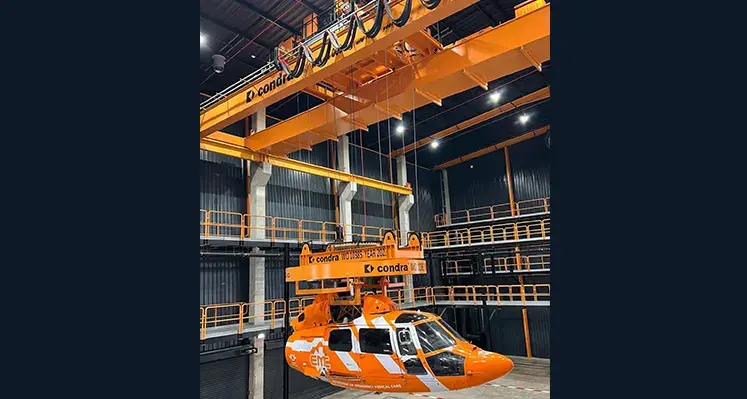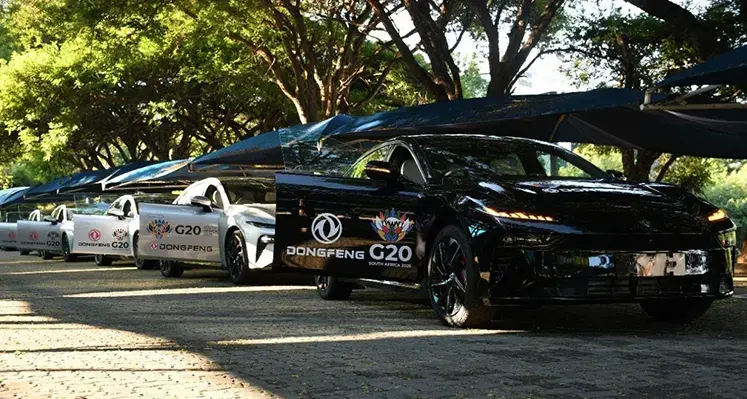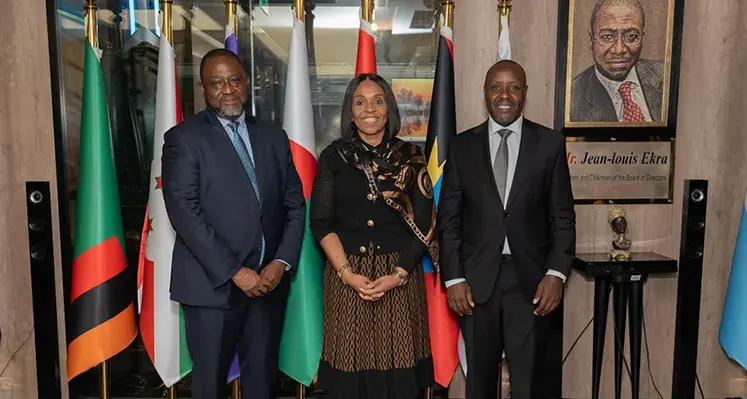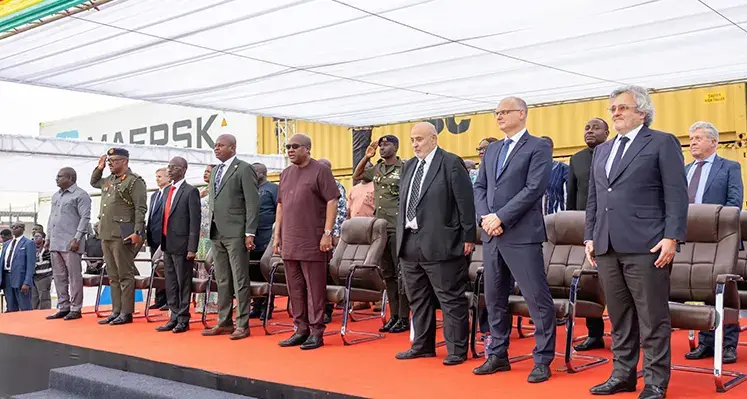Logistics
AFRAA launches Free Route Airspace
The African Airlines Association (AFRAA) has announced a major shift for the continent’s aviation sector with the full-scale rollout of Free Route Airspace (FRA) across the Western and Central Africa (WACAF) region as of 30 October 2025
This development follows the positive outcomes of FRA trials that began in November 2023, enabling airlines to design and operate more direct User Preferred Routes (UPRs). The shift to UPRs marks a significant improvement in operational efficiency, allowing pilots to choose optimal flight paths based on real-time conditions instead of adhering to fixed conventional routes. The result is reduced fuel use, faster journeys and lower emissions, enhancing both sustainability and airline performance.
The African Export-Import Bank (Afreximbank) has backed the FRA programme from the outset, supporting its progression within the framework of its Memorandum of Understanding with AFRAA, the International Civil Aviation Organisation’s Global Air Navigation Plan and the work of the Africa-India FRA Planning and Implementation Regional Group.
The full implementation is the outcome of collaboration between air operators and air navigation service providers, who agreed to conclude the trial period during a joint workshop in Dakar, Senegal.
“The implementation of Free Route Airspace in the WACAF region is a game-changer for African aviation,” said Abdérahmane Berthé, AFRAA secretary general.
“This is a testament to what we can achieve through collaboration. By cutting flight times and fuel consumption, we are not only boosting the competitiveness and profitability of our airlines but also making a significant commitment to environmental sustainability.”
Kanayo Awani, executive vice-president for Intra-African Trade and Export Development at Afreximbank, also highlighted the bank’s continued support: “Efficient, safe, and well-regulated air services are critical to facilitating intra-African trade, tourism and connectivity in line with the objectives of the Single African Air Transport Market (SAATM) and the African Continental Free Trade Area (AfCFTA). Afreximbank is fully committed to supporting the full implementation of SAATM and the establishment of an effective and efficient aviation industry through a range of financing instruments, including its aircraft leasing platform as well as trade facilitation interventions.”
The initiative has already demonstrated tangible benefits for the first airlines involved. Six major carriers, Ethiopian Airlines, Kenya Airways, EGYPTAIR, Royal Air Maroc, RwandAir, and ASKY Airlines, received approval to operate UPRs linking 30 important routes. These optimised trajectories are expected to save more than 1,393 flight hours each year, reduce fuel consumption by 5,000 metric tonnes, avoid 16,000 metric tonnes of CO₂ emissions and cut fuel costs by around US$15mn annually.
With the WACAF region now fully accessible for free routing, airlines can file User Preferred Routes from 30 October 2025. ANSPs have also agreed to process new UPR requests within 48 hours. Once administrative updates across the 24 WACAF states are completed, the approval requirement will be removed entirely from mid-2026.
Following the WACAF milestone, attention will now turn to implementing FRA across the Eastern and Southern Africa (ESAF) region in 2026. Plans also include the creation of a digital coordination platform to simplify the interaction between airlines and ANSPs across the continent.
AGL strengthens Ghana’s maritime gateway
AGL, a shareholder in Meridian Port Services Ltd (MPS), has announced the successful inauguration of the first two phases of the Tema Port expansion project
The expansion, executed by MPS, whose primary stakeholders include AGL, APM Terminals, and the Ghana Ports and Harbours Authority (GPHA), represents a US$1.5bn investment. The initiative involved reclaiming 1,270,000 m² of land from the ocean, deploying advanced handling equipment, and integrating digital systems, further elevating Tema’s role as a strategic maritime gateway in West Africa.
The upgraded terminal now spans 127 hectares and features a 1.4 km quay with four berths capable of receiving ultra-large container vessels with drafts of up to 16 metres. Equipped with cutting-edge technology, the development boosts Tema Port’s container throughput capacity from 800,000 TEU to 3 million TEU annually. By adhering to global operational standards, the revamped Terminal 3 improves efficiency and enhances the competitiveness of Ghana’s logistics network.
“We are committed to ensuring that this infrastructure stimulates not only trade, but also industrial development in the region,” said Philippe Labonne, president of Africa Global Logistics. “Through strong public-private partnerships, we aim to support Ghana’s vision, accelerate intra-African trade, and empower the people who will drive this transformation. Our goal is to make this platform an engine of sustainable growth for Africa.”
With the expanded facilities, Ghana is better positioned to advance its leadership role within the African Continental Free Trade Area (AfCFTA). The project enhances access to international trade routes, supports stronger regional commerce, and stimulates growth in value chains across West Africa and the Sahel.
Additionally, MPS has earned the “Green Terminal” certification from Bureau Veritas, reflecting its adoption of modern port infrastructure aligned with environmentally responsible practices that underpin innovative logistics solutions for the continent’s economic development.
Condra crane utilised for air rescue training

The Condra crane with multiple-rope suspension system and Eurocopter A365N3 helicopter fuselage. (Image source: Condra)
More familiar on yards and construction sites across Africa, a Condra four-ton overhead crane with suspended helicopter fuselage has been deployed to accurately replicate a helicopter motion in the hover, allowing simulated but realistic training of emergency rescue teams
They are part of the University of Johannesburg’s (UJ) newly-opened Rescue Centre, the only facility of its kind in Africa.
By lifting, rotating and tilting the suspended Eurocopter A365N3 helicopter fuselage above a five-metre-deep survival pool, the crane helps deliver an authentic, low-risk training experience at economical cost, allowing trainees to prepare for real-world rescue conditions.
Officially opened in October 2025, the Rescue Centre is a four-storey-high, 3,000 sq m building equipped with a plethora of specialised machinery to immerse trainees in controllable air rescue conditions of high wind, rough seas and heavy rain.
“Hundreds of hours of design work went into the integration of crane and helicopter through a complex system of electronics and control systems,” Condra noted in a statement.
“UJ’s Rescue Centre addresses a critical gap in regional training capabilities by providing an accessible environment to train and re-train coast guard teams, oil rig rescue and multiple other crews who execute land-sea emergency rescue missions.”
As the only facility of its kind in Africa, it establishes Johannesburg as the continent’s hub for advanced rescue training.
African teams that previously had to train abroad for mandatory certification can now train closer to home at lower cost and without any need to use actual helicopters in potentially dangerous weather conditions.
Read more:
Cranes & hoists set for Sierra Leone, Tanzania, Nambia mines
FL Smidth receives portal cranes for Ghana work
BB Cranes for Cape Town machinery factory
South Africa’s largest private freight rail investment
Traxtion has announced the conclusion of a R3.4 billion (approx. US$180mn) rolling stock investment programme aimed at expanding freight capacity and supporting South Africa’s rail reform agenda
The programme, comprising R1.8 billion (approx. US$95.4mn) in locomotives and R1.6 billion (approx. US$84.8mn) in wagons, is the largest private freight rail investment in the country’s history by fleet size and value. It targets a minimum 60% local content and is expected to create 662 direct jobs during build and deployment, addressing about 5% of the national freight rail capacity shortfall.
The investment includes 46 diesel-electric locomotives from KiwiRail in New Zealand, comprising 42 U26C partly modernised units and four fully modernised C30-8MMI locomotives. Traxtion, in collaboration with Wabtec, will upgrade the U26C fleet to C30MEI specification with fuel-efficient 7FDL-EFI engines and advanced Brightstar control systems, enhancing reliability and tractive performance. All upgrades will be conducted at Traxtion’s Rail Services Hub in Rosslyn, supporting local manufacturing and supplier participation.
Shipments of the locomotives will occur in four tranches from April 2026 to August 2027, with each batch undergoing a four-month modernisation cycle including engine and control system upgrades, six-yearly services, and repainting. The first units are scheduled to enter South African mainline operations in Q3 2026.
James Holley, CEO of Traxtion, commented, “Private capital flows when Government policies create confidence in the private sector to invest. This investment is our vote of confidence in South African rail and in the reform momentum we are seeing. Every additional locomotive we put to work lowers logistics costs, protects the road network, improves our environmental footprint, and creates jobs in the upstream economy.”
The programme maximises local industrial value-add through assembly, supplier development, and skills transfer. All wagons will be domestically manufactured by trusted local suppliers. Benefits include high-capacity locomotives for bulk and container flows, job creation, supplier ecosystem growth, and enhanced training and safety through Traxtion’s Government-accredited Rail Training Centre at Rosslyn.
Aligned with South Africa’s rail reform framework, Traxtion expects further investment once the Rail Access Agreement under the Network Statement is fully bankable with service-level guarantees and legal protections.
Sipho Makhubela, CEO of Harith, added, “This investment marks a defining milestone for private sector participation in South Africa’s rail reform journey. As a long-term investor in Traxtion, Harith is confident in rail’s potential to unlock immense economic value. This programme sets a new benchmark for how private investment, aligned with policy certainty and local value creation, can deliver transformative outcomes for South Africa and the continent.”
Traxtion operates across ten African countries with more than 50 locomotives on long-term contracts. On corridors like TAZARA and in the Democratic Republic of Congo, third-party access regimes have significantly increased rail volumes.
Beyond deployment, the R3.4 billion (approx. US$180 million) programme is expected to generate multiplier effects across mining, agriculture, manufacturing, and export logistics by shifting volumes from road to rail. Holley concluded, “Rail is a network industry. When trains move efficiently, the whole economy moves. This programme is about getting South Africa’s freight system working for growth and proving that private-sector investment, aligned with reform, can deliver fast, measurable gains for the country and the region.”
















